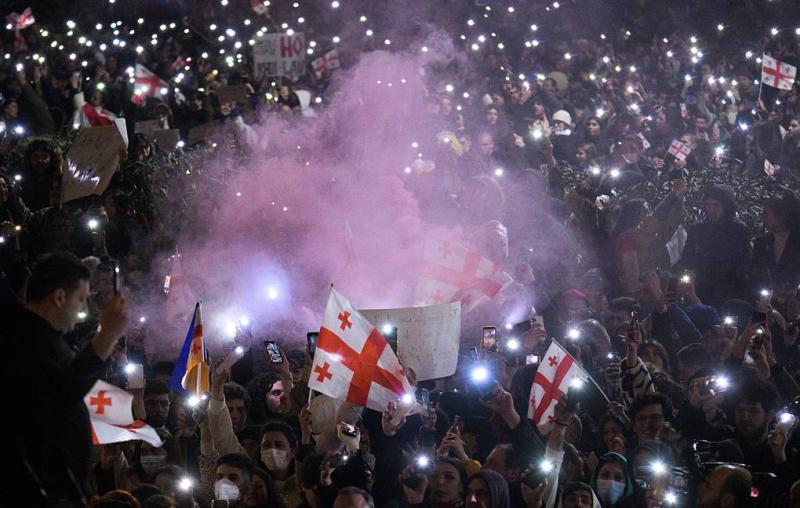
© Alexander Patrin/TASS
Top stories from the Russian press on Friday, March 10th, prepared by TASS
Protests continue in Georgia even after the "foreign agents" bill was withdrawn, Turkey halts transit of sanctioned goods to Russia, and Europe ponders abandoning Russian LNG. These stories topped Friday’s newspaper headlines across Russia.
Izvestia: Georgia withdraws foreign agents bill, but protests continue
The political crisis in Georgia continues - the police responded with water cannons and tear gas when protesters against the bill on foreign agents tried to storm the parliament and block the main roads. As a result of the clashes, the ruling Georgian Dream party decided to repeal the controversial law on the morning of March 9. However, the protests continued. Experts interviewed by Izvestia have mixed opinions on the situation, but they do not rule out the possibility that the protests could eventually lead to a coup.
Some protesters demanded that authorities release all detainees, while others argued that it was impossible to withdraw the bill because the parliament would have to submit it for a second reading and vote against it.
Experts have different perspectives on how the situation might unfold. Senior Research Fellow at the Center for Studies of Caucasus at MGIMO University Nikolay Silaev expects the protests to gradually peter out.
Deputy Director of the Institute of Oriental Studies of the Russian Academy of Sciences Alexander Skakov agrees that the opposition is at an impasse. "They no longer have a leg to stand on because they seem to have lost the only item on the agenda," he told Izvestia.
According to Georgian political scientist Shota Apkhaidze, the goals of the protesters and its Western handlers may go far beyond those covered by the law on foreign agents. "The main goal is to stage a coup - to oust those forces that are trying to establish Georgian sovereignty, to elect a pro-Western government. In order to open a second front against Russia in the Caucasus, Washington wants Tbilisi to join anti-Russian sanctions and begin arming Ukraine. This is a significant and time-consuming task," he told the newspaper.
Vedomosti: Turkey blocks transit of sanctioned goods to Russia
Turkey has suspended the transit of sanctioned goods through its territory to Russia, sources told Vedomosti. According to experts interviewed by the newspaper, the decision was made as a result of pressure from the United States and the tightening of anti-Russian sanctions.
A representative of the Community of Top Managers of Logistics Companies told Vedomosti that problems with the processing of Turkish export and transit declarations for goods destined for Russia began on March 7, noting, "Previously submitted declarations were somehow still processed for about a day, but on March 8 the customs system blocked the submission of information when choosing the Russian Federation as the country of destination."
Arsen Ayupov, a partner in the NSP law firm and Chairman of the Russian-Turkish working group in the RSPP, also confirmed the problem, stressing that "no official comments have been received from the Turkish side."
According to Artem Adrianov from the Institute of International Studies at MGIMO, the fact that the United States is actively exerting pressure on Middle Eastern countries to get them to comply with sanctions is the main factor in the current situation.
"The recent expansion of the US export control list, which now includes consumer electronics, is most likely to blame for Turkey's actions," Ivan Timofeev, program director at the Russian International Affairs Council, told Vedomosti. He explains that after the second set of sanctions, the supply of goods via third countries in circumvention of restrictions "has become a criminal offense in the eyes of US law, and all those involved in such schemes have become accomplices to this crime."
Vedomosti: Failed assassination attempt on Transnistrian leader intended to destabilize region
The unrecognized Transnistria's Ministry of State Security announced on March 9 that a plot by the Ukrainian Security Service to assassinate President Vadim Krasnoselsky had been foiled. According to reports, the attackers were getting ready to detonate an explosive device in the heart of Tiraspol. The primary suspect was assisted by three Ukrainian citizens, one of whom was detained. The report was labeled a "Russian provocation" by the Ukrainian Security Service, which denied any involvement in the incident. According to experts interviewed by Vedomosti, the failed assassination attempt may have been intended to bring the region closer to NATO.
Ivan Konovalov, Development Director at the Foundation for the Promotion of Technologies of the 21st Century, claims that the assassination would have enabled Ukraine and Moldova to eliminate the region's independence without launching an expensive military operation. Instability in Moldova might have led to Romania and its NATO allies becoming more involved in Moldovan affairs and, possibly, to NATO becoming more involved in military operations on the side of Ukraine.
The West is very interested in the destabilization of countries along the perimeter of Russia’s borders, Senior Researcher at the IMEMO RAS Dmitry Ofitserov-Belsky believes. The Ukrainian leadership also seeks to create several new points of tension for the Russian Armed Forces, the expert added.
On the other hand, Director of the Institute of CIS Countries Vladimir Zharikhin believes that any actions of the Armed Forces of Ukraine in relation to Transnistria would be an invasion of the internationally recognized borders of Moldova, in which the US is not yet interested. When reporting sabotage by Ukraine, the authorities of the unrecognized Transnistria are playing it safe and trying to attract the attention of not only Russia, but also Western countries, he added.
Kommersant: Europe considers liberating its market from Russian LNG
The European Commission urged European businesses not to extend long-term contracts for the purchase of LNG in Russia after they expire in order to create space on the European market for "reliable" suppliers. So far, this is just a recommendation since the current long-term contracts for Russian LNG don't end until after 2030, Kommersant writes. The idea of a ban on LNG imports will be difficult to put into practice, analysts believe, and Russia will be able to redirect its LNG to Asian markets.
Russian LNG supplies to Europe will reach a record high of 16.7 bln cubic meters in 2022, up nearly 35% from the previous year, the Center for German Studies of the Institute of Europe at the Russian Academy of Sciences said, noting that a significant part of this volume through other European states was received by Germany, which ceased to receive pipeline gas from Russia.
According to Maria Belova, research director at Vygon Consulting, 33 mln tons of LNG were exported from Russia in 2022, with half of that volume going to Europe. She noted that in 2022, Russian LNG provided about 4.5% of European gas needs, ranking third among the largest suppliers of LNG. The expert believes that the issue of diverting supplies to other markets can be resolved. It is also much simpler to conceal the source of liquefied natural gas than pipeline gas, so a gray LNG market may form, the expert noted.
Vygon Consulting considers Asia the most obvious consumer of Russian LNG, given the shortage of raw materials from other sources. At the same time, Maria Belova noted that replacing Russian volumes may be more or less feasible in 2025-2026 and would largely depend on the dynamics of global demand and the volume of pipeline deliveries of Russian gas.
Izvestia: Russia may introduce law on cryptocurrency mining in July
Russia will pass legislation on cryptocurrency mining and international transactions in the first half of 2023, with the regulations taking effect in July, according to Chairman of the State Duma committee on Financial Market Anatoly Aksakov. According to market participants, the regulations should be implemented as soon as possible, as this would benefit international settlements and improve the industry's security and investment appeal, Izvestia writes.
The bill is now being prepared for consideration in the first reading, the Bank of Russia told Izvestia. According to the regulator, the bill outlines legal requirements for mining and permits the use of cryptocurrencies in international business transactions under an experimental legal framework. The document also specifies a number of requirements and limitations that must be followed by miners and other parties involved in legal transactions involving digital currencies.
The regulation of mining and international payments made with digital currencies is necessary, and it should be introduced sooner rather than later, Director of communications at the Garantex cryptocurrency exchange Evgenia Burova told Izvestia. According to her, 90% of Russian businesses experience significant difficulties with international settlements.
Settlements in cryptocurrency are much faster than traditional banking transactions, lawyer for digital financial assets and blockchain technologies at Anatomy Prava Anton Kutushev said. He noted that there is no need to worry about sanctions being imposed on international transactions involving digital currencies. There are more than 230 cryptocurrency platforms in the world, and those who wanted to restrict access to Russians did so almost immediately.









